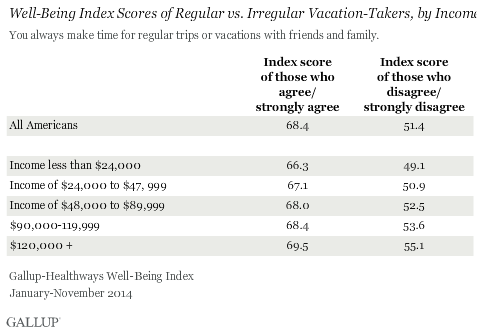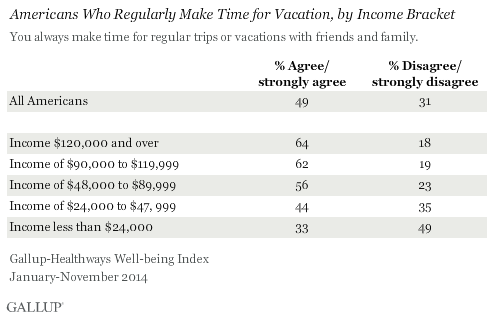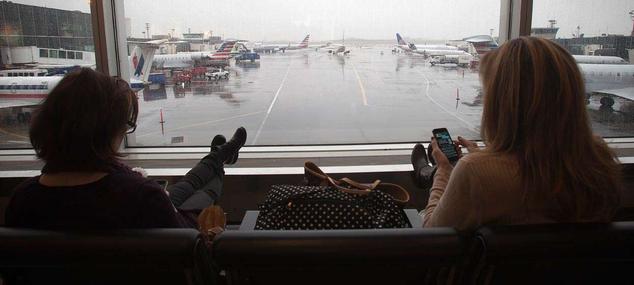Story Highlights
- Vacation frequency a better predictor of well-being than income
- Forty-nine percent of Americans take regular trips or vacations
WASHINGTON, D.C. -- Making time for regular trips or vacations with family and friends is linked to higher overall well-being. Americans who say they take regular trips have significantly higher well-being than those who say they do not, as measured by Gallup-Healthways Well-Being Index scores, and this difference persists across all income groups. In fact, those who earn less than $24,000 annually and say they take regular trips actually have higher well-being (scoring 66.3) than those who earn $120,000 or more but say they don't regularly make time for vacations (55.1).

The link between making regular time for vacations and higher Well-Being Index scores is significant because these scores take into account Americans' self-reported sense of purpose, social relationships, financial security, connection to community, and physical health. Previous Gallup research shows that an individual's Well-Being Index score strongly relates to important health outcomes such as healthcare utilization, life expectancy, new onset disease burden, and change in obesity status.
These data are based on interviews with more than 148,000 Americans from January through November, as part of the Gallup-Healthways Well-Being Index. Gallup asked Americans to indicate whether they make time for regular trips or vacations with family or friends using a one to five agree/disagree scale where a "5" means "strongly agree" and a "1" means "strongly disagree."
About half of Americans agree they regularly take vacations with family and friends, responding "4" or "5" to the statement on the five-point scale, while 31% disagree (responding "1" or "2").
Despite the well-being benefits associated with taking regular vacations, those who make less than $24,000 a year are about half as likely (33%) to make time for such leisure as those who make $120,000 or more annually (64%). This difference is likely due to lower-income Americans' lack of funds, and possibly time, a necessary resource to go on trips or vacations.
Regularly taking vacation time is incrementally more common with each step up the income ladder.

While income is the top factor determining whether Americans agree that they regularly make time for vacations and trips with others, there are other differences across demographic groups.
- Asians (55%) and whites (52%) are most likely to agree that they regularly take vacations, while the figures are lower for blacks (44%) and Hispanics (42%).
- A majority (57%) of Americans over age 65, compared with less than half of those aged 18-29 (47%), 30-44 (46%), and 45-64 (49%), make time for regular trips or vacations.
- Slightly less than half (47%) of Americans with children under age 18 in their households regularly make time for vacations or trips, a bit lower than the 51% found among those who don't have children in their homes.
- Married Americans (56%) are most likely to take vacations with friends and family, followed by widowers (47%), single folks (43%), and those with a domestic partner (43%). People who are divorced (37%) or separated (30%) are least likely to regularly take such trips.
Bottom Line
Regardless of income, Americans who make time for vacations or trips with family and friends have higher overall well-being than those who don't. Some studies suggest that vacation time has positive effects on the brain and heart, and could ultimately lower healthcare costs -- which would be good news for employers.
The exact causal path underneath this relationship is not clear. While it is likely that taking regular vacations may cause Americans to have higher well-being for the rest of the year, it is also possible that Americans with higher well-being to begin with are more inclined and motivated to travel than are those with lower well-being.
It would seem that those who can afford a week-long cruise or airfare to a foreign country might experience a greater boost in their overall well-being than those who can't. But for Americans on a budget, this same -- or an even greater - uptick in well-being might come just as easily from a weekend camping trip or driving to visit relatives. The well-being benefits may come more from anticipating the trip, developing or deepening relationships with family and friends, and recalling fond memories of the trip than the degree of luxury involved.
This research showing a link between taking vacations and well-being suggests that employers may benefit from encouraging their workers to make time for regular trips. Higher well-being predicts key business outcomes such as lower absenteeism and turnover, as well as fewer workplace safety incidents. Employers may want to arrange for workers to take paid time off, plan regular company outings that are open to family and friends, and foster a culture that makes it acceptable to take time off for vacation.
Survey Methods
Results are based on telephone interviews conducted Jan. 1-Nov. 30, 2014, as part of the Gallup-Healthways Well-Being Index survey, with a random sample of 148,854 adults, aged 18 and older, living in all 50 U.S. states and the District of Columbia. For results based on the total sample of national adults, the margin of sampling error is ±1 percentage points at the 95% confidence level.

Each sample of national adults includes a minimum quota of 50% cellphone respondents and 50% landline respondents, with additional minimum quotas by time zone within region. Landline and cellular telephone numbers are selected using random-digit-dial methods.
Learn more about how the Gallup-Healthways Well-Being Index works.

